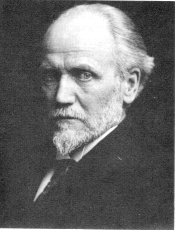| Profile | Major Works | Resources |
Karl Gustav Cassel, 1866-1945.

Swedish Neoclassical economist.
Originally from a wealthy family of Stockholm, Gustav Cassel started off his studies in engineering, but soon shifted over to pure mathematics. Cassel submitted an ambitious dissertation on automorphic functions to earn his doctorate from the University of Uppsala in 1894. Cassel went on to teach mathematics in Stockholm, but soon tired of it, and instead turned his attention to economics, hoping to bring his mathematical tools to bear on the field. Cassel came across the work of Walras and the Lausanne School, and already in 1899, published an article in the German journal outlining the formalization of general equilibrium theory (the Walras-Cassel System).that he would bring to fruition two decades later.
After a period of foreign travel and a flurry of articles in German, English and Swedish journals, Cassel began to make a name for himself as an economist, and particularly an expert in monetary economics, while looking for an academic perch. In 1901, Cassel failed in his candidacy for the new professorship of economics at Lund University (it went to Knut Wicksell). He tried again in 1904, for the economics chair being created at Stockholm University (then called Stockholms Högskola) and this time he succeeded. Cassel remained professor of economics ("national economy and finance") at Stockholm until his retirement in 1933.
Gustav Cassel has the unfortunate distinction of belonging to that distinct group of influential economists who are intensely disliked by everyone. The Stockholm School, where he taught for many years, did its utmost to dissociate itself from him due to Cassel's bitter rivalry with their beloved master, Knut Wicksell. Although Walrasians applauded his general equilibrium work, they cringed at his attacks on utility theory. The Marshallians disliked him for exactly the opposite reason. The Austrians resented him for having helped bury Böhm-Bawerk's theory of capital and interest. And, finally, the Keynesians have no love for one of the most vociferous opponents of Keynesian Revolution. All this was not helped by Cassel's abrasive personality and his refusal to acknowledge others' work. As Hans Brems notes:
"A writer less generous than Cassel would be hard to find. Marx at least paid tribute to Quesnay and Ricardo. Cassel paid tribute to nobody. Walras had written the first system of simultaneous equations of general equilibrium. Pareto had purged it of any measure of sensations. Cassel followed both but mentioned neither...We must not treat Cassel the way he treated others. We must respect him as a pioneer." (H. Brems, 1981: p.158)
Nonetheless, despite all the antipathy, Gustav Cassel has remained a silent giant in 20th century economics. Cassel maintained the Lausanne torch alight with his magnificent Theory of Social Economy (written before WWI, but only published in German in 1918 and translated to English in 1923). However, there were a few bizarre twists: marginal productivity was dumped in favor fixed coefficient technology; utility theory, following up on his 1899 contribution, is dropped by the wayside. In his opinion:
"This purely formal [utility] theory, which in no way extends our knowledge of actual processes, is in any case superfluous for the theory of prices...[T]his deduction of the nature of demand from a single principle, in which so much childish pleasure has been taken, was only made possible by artificial constructions and a considerable distortion of reality."
(Gustav Cassel, Theory of Social Economy1918: p.81).
Nonetheless, the Cassel's general equilibrium system on the basis of demand functions was the reading material of the Vienna Colloquium in the 1930s and the fundamental contributions of John von Neumann and Abraham Wald, which did so much to create modern Neo-Walrasian economics would not have occurred had Cassel not written his text. It was through his work that the concept of a "steady-state growth" equilibrium was introduced. [see review of the Walras-Cassel system.]
Among his other contributions is the rudiments of a "purchasing power parity" theory of exchange rates (1921) and an "overconsumption" theory of the trade cycle (1918). His Nature and Necessity of Interest (1903), in turn, was an attempt at resurrecting Walras's theory of capital. He also worked on the German reparations problem. His review of Keynes's General Theory in 1937 was one of the most critical.
Alongside his academic career, Cassel was also regular contributor to the Swedish political press, usually in the conservative Svenska Dagbladet. Presenting himself as a technocrat, Cassel sat on numerous committees for the Swedish government and the central bank (Riksbank). He also published numerous pamphlets advising (or criticizing) the economic policies of the government or the opposition. His condemnation of the Social Democrats' program before the 1928 elections was notoriously harsh.
|
Major works of Gustav Cassel
|
HET
|
|
Resources on Gustav Cassel
|
All rights reserved, Gonçalo L. Fonseca
